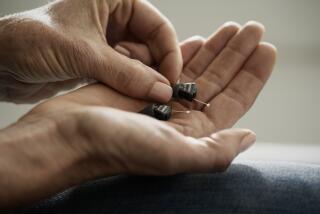Did you hear? One in five Americans has hearing loss
- Share via
One in five Americans has hearing loss.
Yes, you heard that right.
A study published Monday in Archives of Internal Medicine found that 20% of Americans over the age of 12 experience hearing loss in at least one ear. That figure surprised study leader Dr. Frank R. Lin, an assistant professor of otolaryngology and epidemiology at Johns Hopkins School of Medicine and Bloomberg School of Public Health in Baltimore.
Lin and his colleagues also found that nearly 13% of Americans suffered hearing loss in both ears. That was about what Lin had expected, he said.
Other studies have sought to determine how many people in specific populations (women, for example, or teenagers) have some sort of hearing loss, but there has never been a number for the entire United States, Lin said.
Because hearing loss could eventually lead to bigger problems, such as developing dementia or social isolation, understanding how many people are affected is not a trivial matter, Lin said.
“You need a number to begin with in order to understand the public health impact,” he said.
Researchers used data from the National Health and Nutritional Examination Surveys (NHANES), a program that has periodically gathered health data from cities all over the country and statistically mimics the U.S. population.
For any adult, the loss of hearing could impair their ability to communicate efficiently, which opens doors to neurobiological issues, Lin said.
“With bad hearing, your brain has to allocate more of its resources to help with hearing at the expense of cognition,” he said. “This may be a factor that could lead to developing dementia over time.”
The inability to communicate properly could also lead to social isolation, which studies have found can lead to bad health outcomes.
A 2004 study published in the journal Psychoneuroendocrinology found that social isolation and loneliness were linked to depression, hopelessness, low self-esteem and reported sleep problems. And a study this year in Health Psychology found that loneliness was associated with a greater risk of being inactive, smoking, as well as blood pressure problems and the development of cardiovascular disease.
The big problem with hearing loss, Lin said, is that people assume it’s an unavoidable part of aging and don’t seek medical help. The loss comes on very slowly and when it happens it’s easy to ignore because people have become accustomed to it, Lin said. Unless it’s acute hearing loss, then “people go crazy.”
There’s nothing you can do about losing your hearing due to genetics or age, but other forms of impairment could be prevented by simply turning down the volume on your iPod, Lin said.
Anyone who suspects they have any type of hearing loss -- or are constantly being told by their families that they aren’t listening -- should consider a consultation with an audiologist, Lin said.
“If it’s confirmed, you should really get treated,” he said. Hearing aids have proved to be a no-risk treatment, he said. “It’s been clearly established that hearing aids can only help and not hurt.”
A summary of the study is available online here.
Return to the Booster Shots blog.






